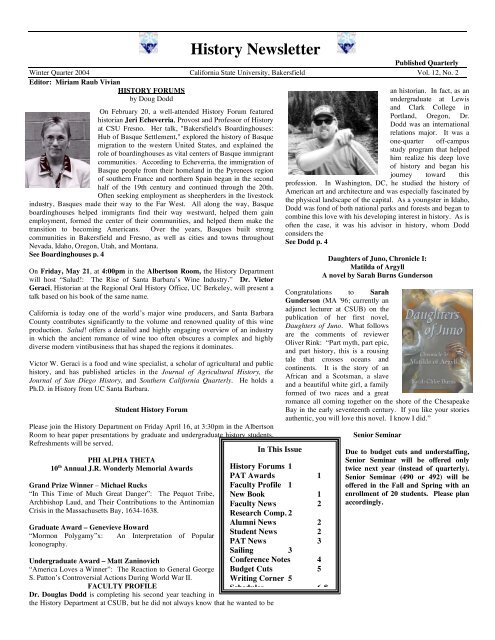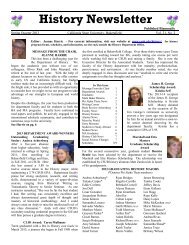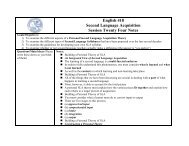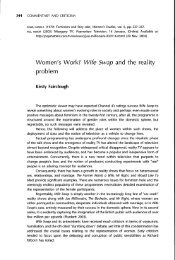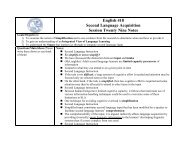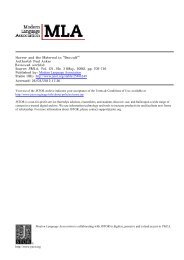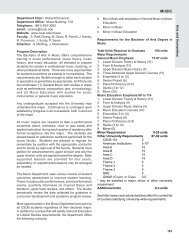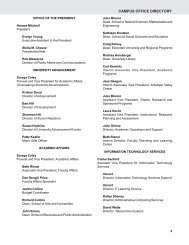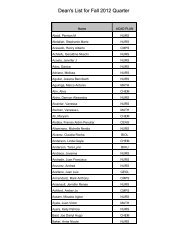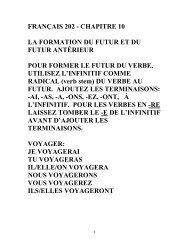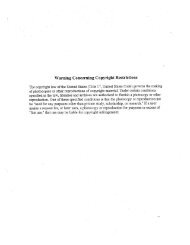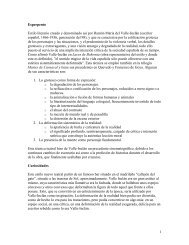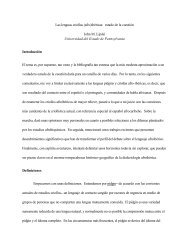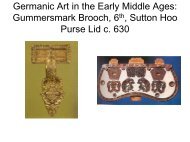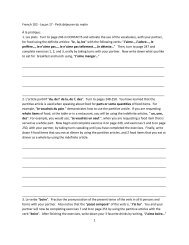History Newsletter - California State University Bakersfield
History Newsletter - California State University Bakersfield
History Newsletter - California State University Bakersfield
You also want an ePaper? Increase the reach of your titles
YUMPU automatically turns print PDFs into web optimized ePapers that Google loves.
<strong>History</strong> <strong>Newsletter</strong><br />
Published Quarterly<br />
Winter Quarter 2004 <strong>California</strong> <strong>State</strong> <strong>University</strong>, <strong>Bakersfield</strong> Vol. 12, No. 2<br />
Editor: Miriam Raub Vivian<br />
HISTORY FORUMS<br />
by Doug Dodd<br />
On February 20, a well-attended <strong>History</strong> Forum featured<br />
historian Jeri Echeverria, Provost and Professor of <strong>History</strong><br />
at CSU Fresno. Her talk, "<strong>Bakersfield</strong>'s Boardinghouses:<br />
Hub of Basque Settlement," explored the history of Basque<br />
migration to the western United <strong>State</strong>s, and explained the<br />
role of boardinghouses as vital centers of Basque immigrant<br />
communities. According to Echeverria, the immigration of<br />
Basque people from their homeland in the Pyrenees region<br />
of southern France and northern Spain began in the second<br />
half of the 19th century and continued through the 20th.<br />
Often seeking employment as sheepherders in the livestock<br />
industry, Basques made their way to the Far West. All along the way, Basque<br />
boardinghouses helped immigrants find their way westward, helped them gain<br />
employment, formed the center of their communities, and helped them make the<br />
transition to becoming Americans. Over the years, Basques built strong<br />
communities in <strong>Bakersfield</strong> and Fresno, as well as cities and towns throughout<br />
Nevada, Idaho, Oregon, Utah, and Montana.<br />
See Boardinghouses p. 4<br />
On Friday, May 21, at 4:00pm in the Albertson Room, the <strong>History</strong> Department<br />
will host “Salud!: The Rise of Santa Barbara’s Wine Industry.” Dr. Victor<br />
Geraci, Historian at the Regional Oral <strong>History</strong> Office, UC Berkeley, will present a<br />
talk based on his book of the same name.<br />
<strong>California</strong> is today one of the world’s major wine producers, and Santa Barbara<br />
County contributes significantly to the volume and renowned quality of this wine<br />
production. Salud! offers a detailed and highly engaging overview of an industry<br />
in which the ancient romance of wine too often obscures a complex and highly<br />
diverse modern vintibusiness that has shaped the regions it dominates.<br />
Victor W. Geraci is a food and wine specialist, a scholar of agricultural and public<br />
history, and has published articles in the Journal of Agricultural <strong>History</strong>, the<br />
Journal of San Diego <strong>History</strong>, and Southern <strong>California</strong> Quarterly. He holds a<br />
Ph.D. in <strong>History</strong> from UC Santa Barbara.<br />
Student <strong>History</strong> Forum<br />
Please join the <strong>History</strong> Department on Friday April 16, at 3:30pm in the Albertson<br />
Room to hear paper presentations by graduate and undergraduate history students.<br />
Refreshments will be served.<br />
PHI ALPHA THETA<br />
10 th Annual J.R. Wonderly Memorial Awards<br />
Grand Prize Winner – Michael Rucks<br />
“In This Time of Much Great Danger”: The Pequot Tribe,<br />
Archbishop Laud, and Their Contributions to the Antinomian<br />
Crisis in the Massachusetts Bay, 1634-1638.<br />
Graduate Award – Genevieve Howard<br />
“Mormon Polygamy”x: An Interpretation of Popular<br />
Iconography.<br />
Undergraduate Award – Matt Zaninovich<br />
“America Loves a Winner”: The Reaction to General George<br />
S. Patton’s Controversial Actions During World War II.<br />
FACULTY PROFILE<br />
Dr. Douglas Dodd is completing his second year teaching in<br />
the <strong>History</strong> Department at CSUB, but he did not always know that he wanted to be<br />
In This Issue<br />
<strong>History</strong> Forums 1<br />
PAT Awards 1<br />
Faculty Profile 1<br />
New Book 1<br />
Faculty News 2<br />
Research Comp. 2<br />
Alumni News 2<br />
Student News 2<br />
PAT News 3<br />
Sailing 3<br />
Conference Notes 4<br />
Budget Cuts 5<br />
Writing Corner 5<br />
Schedules 6 8<br />
an historian. In fact, as an<br />
undergraduate at Lewis<br />
and Clark College in<br />
Portland, Oregon, Dr.<br />
Dodd was an international<br />
relations major. It was a<br />
one-quarter off-campus<br />
study program that helped<br />
him realize his deep love<br />
of history and began his<br />
journey toward this<br />
profession. In Washington, DC, he studied the history of<br />
American art and architecture and was especially fascinated by<br />
the physical landscape of the capital. As a youngster in Idaho,<br />
Dodd was fond of both national parks and forests and began to<br />
combine this love with his developing interest in history. As is<br />
often the case, it was his advisor in history, whom Dodd<br />
considers the<br />
See Dodd p. 4<br />
Daughters of Juno, Chronicle I:<br />
Matilda of Argyll<br />
A novel by Sarah Burns Gunderson<br />
Congratulations to Sarah<br />
Gunderson (MA '96; currently an<br />
adjunct lecturer at CSUB) on the<br />
publication of her first novel,<br />
Daughters of Juno. What follows<br />
are the comments of reviewer<br />
Oliver Rink: “Part myth, part epic,<br />
and part history, this is a rousing<br />
tale that crosses oceans and<br />
continents. It is the story of an<br />
African and a Scotsman, a slave<br />
and a beautiful white girl, a family<br />
formed of two races and a great<br />
romance all coming together on the shore of the Chesapeake<br />
Bay in the early seventeenth century. If you like your stories<br />
authentic, you will love this novel. I know I did.”<br />
Senior Seminar<br />
Due to budget cuts and understaffing,<br />
Senior Seminar will be offered only<br />
twice next year (instead of quarterly).<br />
Senior Seminar (490 or 492) will be<br />
offered in the Fall and Spring with an<br />
enrollment of 20 students. Please plan<br />
accordingly.
FACULTY NEWS<br />
On March 5, 2004, Dr. Alicia Rodriquez delivered a scholarly paper at the Texas<br />
<strong>State</strong> Historical Association’s 108 th Annual Meeting, held in Austin, Texas. Most<br />
students of Populism regard the political and social movement as one established<br />
and led by farmers, for farmers. Dr. Rodriquez studies the role that urban workers<br />
played in the movement. Her paper, “Labor’s Role in the Creation of the People’s<br />
Party in Dallas, Texas,” examined how events in the 1880s and early 1890s (such<br />
as strikes and other labor disputes) led urban laborers to take the initiative in<br />
establishing a branch of the Populist Party in Dallas in 1891, and how their efforts<br />
directly led to the founding of the state party in Texas in that year as well. Her<br />
paper also explored laborers’ political ideology and their ideological exchange with<br />
farmers. In his influential book Origins of the New South (1951), C. Vann<br />
Woodward identified three coalitions that were part of the People’s Party. These<br />
coalitions were southern and western farmers, farmers and laborers, and blacks and<br />
whites. While the first of these has received much attention from scholars, and the<br />
third has received moderate attention, little has been given to the second, which Dr.<br />
Rodriquez’s paper examined.<br />
* * * * * * * * *<br />
Last Spring Professor Rodriquez was selected to participate in a Summer Seminar<br />
sponsored by the National Endowment for the Humanities. Historian Don Doyle, a<br />
respected scholar of Southern urban and community history, directed the seminar,<br />
titled “Faulkner and Southern <strong>History</strong>.” Fifteen scholars from all over the United<br />
<strong>State</strong>s participated in the program, which was held in June and July 2003, and was<br />
hosted by Vanderbilt <strong>University</strong> in Nashville, Tennessee. Participants in the<br />
intensive five-week seminar read several of William Faulkner’s short stories and<br />
four of his novels, including Absalom, Absalom!, The Unvanquished, and Intruder<br />
in the Dust. The scholars discussed the novels and the historical events and<br />
backgrounds that served as Faulkner’s inspiration for the themes and subjects about<br />
which he wrote. The seminar participants also read a number of historical articles<br />
and books to help them fully appreciate Faulkner’s world and evaluate his use of<br />
history in his work. The historical works that the scholars read included Don<br />
Doyle’s Faulkner’s County: The Historical Roots of Yoknapatawpha, Joel<br />
Williamson’s William Faulkner and Southern <strong>History</strong>, Neil McMillen’s Dark<br />
Journey: Black Mississippians in the Age of Jim Crow, and Drew Gilpin Faust’s<br />
Mothers of Invention: Women of the Slaveholding South in the American Civil<br />
War. The participants, who had access to the extensive holdings in Vanderbilt<br />
<strong>University</strong>’s library, also worked on their own research projects during the course<br />
of the seminar. Professor Doyle, a gracious host, led the seminar participants on a<br />
number of field trips and also scheduled several dinners at restaurants serving<br />
authentic Southern cuisine. The seminar ended with the last days held at the<br />
<strong>University</strong> of Mississippi, in Oxford, Mississippi, where Faulkner lived most of his<br />
life. Professor Rodriquez regards the experience as one of the most rewarding of<br />
her academic career. Her immersion in Faulkner and in the South led not only to<br />
her developing a deeper understanding and appreciation of William Faulkner’s<br />
work, Southern history, and the American South, but also to her making many new<br />
friends among the seminar’s participants.<br />
CSUB Student Research Competition<br />
Congratulations to the following history majors who participated in the CSUB<br />
Research Competition held on Friday, March 5:<br />
John Kennedy (BA), “USS Brooks: Auxiliary Personnel Destroyer in the Pacific<br />
Theatre, September 1942-January 1945.” Mentor: Doug Dodd.<br />
2<br />
Rebecca Orfila (MA), “Dirt Streets and Demimondes: The<br />
Tenderloin of <strong>Bakersfield</strong>, 1870-1910.” Mentor: Doug Dodd.<br />
Oliver Rosales (MA), “The Chicano Movimiento at<br />
<strong>Bakersfield</strong> College.” Mentor: Connie Orliski.<br />
Rebecca placed second and John placed third. Both qualify to<br />
go on to the CSU-wide Student Research Competition, to be<br />
held at CSUN in April.<br />
ALUMNI NEWS<br />
CSUB <strong>History</strong> graduate (BA’95) and former Runner editor<br />
Bob Christie shared the Bill Farr Award last spring with<br />
Executive Editor Mike Jenner of The <strong>Bakersfield</strong><br />
<strong>California</strong>n—in recognition of his efforts as City Editor in<br />
opening government records to the public. The award was<br />
given by the <strong>California</strong> First Amendment Coalition. The Farr<br />
Award is named after Los Angeles Herald Examiner reporter<br />
Bill Farr, who went to jail in 1971 for refusing to reveal<br />
sources of a leak in the Charles Manson case. Bob<br />
spearheaded efforts to force the Kern county Fire Department<br />
to hand over their payroll records. Congratulations, Bob!<br />
Jason Plume (BA’02), currently completing his MA in<br />
Political Science at CSU Chico, has accepted an offer from<br />
Syracuse <strong>University</strong> to pursue a PhD in Political Science<br />
beginning next fall. Syracuse is giving him a generous<br />
package for graduate study that includes a teaching<br />
assistantship, a tuition waiver, and health insurance.<br />
Congratulations, Jason!<br />
After graduating from CSUB in 2002, Michael <strong>State</strong>r, Phi<br />
Alpha Theta member, obtained his single subject credential<br />
from Fresno <strong>State</strong> and is now teaching seventh and eighth<br />
grade social studies at Cherry Middle School in Tulare.<br />
Jeff Kasinger (BA’99) and Kiahna Williams (BA’99) are<br />
teaching at Myrtle Avenue School in Lamont, fifth and fourth<br />
grades respectively.<br />
STUDENT NEWS<br />
Mike Rucks (MA student) announces the birth of his son,<br />
Andrew Scott Rucks, born on Feb. 3, weighing in at 9 lbs.<br />
Congratulations, Mike and Ellen.<br />
If you would like to let your classmates know what you<br />
have been doing since graduation, please contact the<br />
<strong>History</strong> Department at 664-3079. We would love to<br />
include your information in our next newsletter.
Judging for the 10 th annual Phi Alpha Theta paper competition has been<br />
completed. This year's winners are announced on page 1 of the<br />
newsletter. Congratulations Michael, Genevieve, and Mathew!<br />
Not only do these awards help provide us with a program at our annual<br />
Phi Alpha Theta banquet (this year on April 17), but they encourage our<br />
students to excel by giving them an opportunity to share their scholarly<br />
work and be recognized for their achievement. I thank all those students<br />
who contributed papers to the competition, and congratulations to the<br />
winners!<br />
If you've just finished a research paper for a course, or write one next<br />
quarter or next fall, please consider saving it to submit to next year’s<br />
competition in January 2005 (you needn’t still be an enrolled student at<br />
that point). Papers in Historical Writing and Senior Seminar are<br />
generally very appropriate. The paper should have earned an “A” of<br />
some kind, meaning that the instructor’s grading functions as a screening<br />
process. You are, of course, welcome to revise the paper in any way you<br />
like for this competition. Competition entry forms will be available<br />
outside the <strong>History</strong> Department office next December and will be mailed<br />
out at that time to all enrolled Phi Alpha Theta members.<br />
Our next major activity here in town is the annual member banquet—<br />
perhaps our most important annual activity; certainly it provides a<br />
number of important functions: we initiate new members into Phi Alpha<br />
Theta, acknowledging their academic success; we have an opportunity to<br />
hear about student research from our annual JR Wonderly Award<br />
winners; and we enjoy a nice dinner and the chance to socialize with<br />
other members.<br />
This year's banquet will be held on Saturday, April 17. Please mark<br />
your calendars now. All current/active and alumni members are invited<br />
and are welcome to bring family and friends. If you would like more<br />
details, please contact Jean Stenehjem in the <strong>History</strong> Department office<br />
at 664-3079, weekdays between 8am and 2pm.<br />
The following students will be among those initiated as new members at<br />
his event:<br />
Robert C. Boyles, Genevieve Howard, Ruben J. Ibarra, Rebecca S.<br />
Orfila, Sergio E. Perez, Candice L. Urmston, Lindsey M. White, and<br />
Mathew V. Zaninovich.<br />
Congratulations to all of you!<br />
Phi Alpha Theta News<br />
by Miriam Raub Vivian, Psi-Zeta chapter advisor<br />
Sailing in the path of Richard Henry Dana<br />
We are now recruiting new members for the spring banquet/initiation, so<br />
if you think you qualify for membership in Phi Alpha Theta, please fill<br />
out a red application form, available outside my office door or that of the<br />
department office, and leave it with me or Jean Stenehjem in the <strong>History</strong><br />
Department office. Membership requires a 3.1 GPA in a minimum of<br />
four CSUB history courses (a 3.5 for grad students); however, if you<br />
have 3 courses, but have earned As in each of them, you may also<br />
qualify. Membership furthermore requires an overall 3.0 GPA. The cost<br />
is $40.00, which goes to the national office and provides a lifetime<br />
membership.<br />
Phi Alpha Theta members enjoy the opportunity to participate in the<br />
annual Southern <strong>California</strong> Regional Student Paper Conference. This<br />
year it will be held at Vanguard <strong>University</strong> on Saturday, April 24. Four<br />
CSUB <strong>History</strong> students are slated to present papers there.<br />
Congratulations and thanks to the following students for committing to<br />
this scholarly endeavor:<br />
Christopher Livingston, Michael Rucks, Joshua Sullivan-Pires, and<br />
Mathew Zaninovich.<br />
By next quarter some of you will be thinking about graduation. PAT<br />
members are eligible to purchase an honor cord to wear at<br />
commencement. If you would like to have one of these as part of your<br />
regalia, you may purchase one from me for $12.00 during spring quarter.<br />
You save over $5.00 because we make one chapter order, which earns us<br />
a discount, and we pay the shipping costs for you—quite a deal!<br />
Finally, there are several opportunities for members of our chapter to<br />
compete for national PAT awards. I have posted details on the Phi Alpha<br />
Theta bulletin board outside the department office, but will mention here<br />
that there are national paper awards, for which the deadline is July 1. If<br />
you’ve written an exceptional paper that won a chapter award or<br />
significant praise, you might consider submitting it. You will need a<br />
letter of recommendation from me. If deemed suitable for publication,<br />
your paper could be published in an issue of The Historian, the Phi<br />
Alpha Theta journal. Kathleen Freeland (MA '03) has twice won<br />
national paper awards.<br />
Finally, save this date: Friday, June 4. That's the day set for our<br />
annual <strong>History</strong> Department bbq at Faculty Towers. We have scheduled<br />
this event from 3:30 to about 5pm or so. It will include an early dinner,<br />
in part provided by Phi Alpha Theta and in part by your contributions to<br />
this potluck. You should receive further information in the mail in May.<br />
For the second year in a row, Pt. Loma Nazarene <strong>University</strong>, in conjunction with the San Diego Maritime Museum, is offering those interested an<br />
opportunity to sail along the Channel Islands on the <strong>California</strong>n, a replica of an 1847 Revenue Cutter that patrolled the coast of <strong>California</strong>. This 9-day<br />
adventure may be taken for 2 units of credit in Graduate Education—or just pursued as an enriching and educational experience. The focus of study<br />
will be R.H. Dana's Two Years Before the Mast, which will provide insight into <strong>California</strong>'s coastal history and geography before the Gold Rush, and<br />
the museum captain and crew will train students to work as the crew on the boat. Undergraduates, graduate students, eager high school students and<br />
teachers, and interested community members are eligible to participate. One of our graduate students, Kirk Given, had a wonderful experience aboard<br />
the <strong>California</strong>n last summer.<br />
For more information on this exciting opportunity (from July 30-August 7), contact Prof. Rick Kennedy at rkennedy@ptloma.edu (619-849-2537).<br />
Cost is approximately $1,450.00. Space is limited, so inquire early.<br />
3
CONFERENCE NOTES<br />
Professor C. Orliski<br />
As devotees of lifelong learning, CSUB faculty from various<br />
departments attended the women’s studies conference, “Feminism<br />
Unbound: Crossing Borders,” held at the Huntington Library in March.<br />
The keynote address, “The Centrality of Feminisms in American<br />
<strong>History</strong>, 1775-2000,” given by Kathryn Kish Sklar, Distinguished<br />
Professor of <strong>History</strong> from the <strong>State</strong> <strong>University</strong> of New York at<br />
Binghamton, may be of particular interest to those who complain that<br />
history consists of a boring series of the “usual suspects” (political<br />
leaders, captains of industry, mighty warriors, daring explorers, etc.).<br />
Focusing on the changing meanings of “feminism” over time, Sklar<br />
identified specific events from the 1780s, 1850s, 1910s, and 1990s to<br />
show how women’s activities are central to mainstream narratives of<br />
social history. The more than $300,000 that elite women contributed to<br />
the Continental Army was critical to its maintenance during the<br />
Revolutionary War. The conventions associated with the women’s<br />
rights movement of the mid-nineteenth century not only articulated<br />
important issues in American life, such as family reform, but also<br />
reflected both the centrality of oratory and the revision of state<br />
constitutions as a constant process in American political culture. In the<br />
early twentieth century, women’s suffrage was a key topic in the<br />
debates between Booker T. Washington and W. E. B. DuBois regarding<br />
the relationship between economic improvement and political rights for<br />
African Americans. In 1994, the Violence Against Women Act<br />
highlighted the persistence of gender inequality in the justice system as<br />
well as the ability of the government to defend the rights of an<br />
individual.<br />
Sklar illuminated a number of ways in which gender may be used as a<br />
basis for interpreting themes in history more generally and how it acts<br />
as powerful vehicle for understanding American political culture in<br />
particular. For more on women in U.S. history, see<br />
http://www.womhist.binghamton.edu<br />
Boardinghouses, cont. from p.1<br />
Boardinghouses, such as the Noriega Hotel in <strong>Bakersfield</strong>, were the<br />
first places Basque immigrants went upon their arrival in a new city.<br />
The boardinghouses were community centers that offered lodging,<br />
meals, information on employment, and guidance for new arrivals on<br />
how to assimilate in their new country. The boardinghouses also<br />
allowed them to enjoy traditional activities, such as handball games.<br />
For Basques who had found employment as shepherds, the<br />
boardinghouse provided a place to stay during the winter months.<br />
Boardinghouses had kennels for the sheep dogs and stables for the<br />
horses and mules. Today, many of these boardinghouses have<br />
disappeared, although several remain in operation as restaurants and<br />
cultural centers.<br />
Echeverria's talk was drawn from her recent book, Home Away From<br />
Home: A <strong>History</strong> of Basque Boardinghouses (Reno: <strong>University</strong> of<br />
Nevada Press, 1999).<br />
4<br />
Dodd, cont. from p. 1<br />
foremost public historian in Oregon, who encouraged him to pursue public<br />
history (and eventually graduate studies) and even helped him and a friend<br />
get the contract to do a cultural resources survey for a small town in<br />
Oregon. This two-year project, though it paid poorly, provided invaluable<br />
experience in hands-on public history. UC Santa Barbara, with a<br />
reputation for strong programs in both public and environmental history,<br />
attracted Dodd for his MA and PhD. It was there that he met his future<br />
wife, as well, Professor Alicia Rodriquez.<br />
It was also at UCSB that Dr. Dodd wrote his dissertation on the struggle<br />
between the US Forest Service and the National Park Service over the<br />
Sawtooth National Park proposal. His current research examines the<br />
history of the development of the National Recreation Areas, the first of<br />
which was created at Lake Mead, behind Hoover Dam, in 1936. Congress<br />
has created forty more of these since then. These NRAs have often been<br />
created as a kind of compromise between the multiple-use National<br />
Forests and BLM lands, and the preservation-oriented National Parks and<br />
National Monuments. This research has taken Dr. Dodd to the National<br />
Archives in College Park, Maryland, as well as regional National Archives<br />
branches in Laguna Niguel, San Bruno, Seattle, and Denver. Some of this<br />
research will be presented in October at the Western Historical<br />
Association's meeting in Las Vegas.<br />
Dr. Dodd teaches a Seminar in Public <strong>History</strong> for our department, a course<br />
which now satisfies the senior seminar requirement, and soon expects to<br />
offer courses in both American environmental history and the history of<br />
American Indians. His experience teaching public history has well<br />
situated him to participate in a roundtable panel, "Teaching Public <strong>History</strong><br />
to Undergraduates: Challenges and Opportunities," in early April in<br />
Victoria, British Columbia.<br />
When he's not teaching, grading papers or exams or conducting research,<br />
Dr. Dodd enjoys hiking, fly-fishing, traveling and canoeing (see the photo<br />
of him on the North Fork of the Payette River in Idaho). He enjoys music<br />
by Neil Young and lists the following books among his favorites: Norman<br />
Maclean’s A River Runs Through It and Other Stories; two by Wallace<br />
Stegner: Angle of Repose and The Big Rock Candy Mountain; and almost<br />
anything by John McPhee, especially Basin and Range, Coming into the<br />
Country, and Assembling <strong>California</strong>.<br />
Aside from affordable housing, Dr. Dodd enjoys <strong>Bakersfield</strong> in part<br />
because of its proximity to so many things he enjoys: the Huntington<br />
Library, Sequoia, Yosemite and the best parts of the Eastern Sierra<br />
Nevada.<br />
Finally, here, in his own words, is something few know about Dr. Dodd-his<br />
brief film career: "When I was in sixth grade, I was an extra in one of<br />
Clint Eastwood’s movies. He filmed Bronco Billy in and around my<br />
hometown of Nampa, Idaho, and my whole class got to be extras for two<br />
days. I was in the wild west show scene—look for the blond kid in the<br />
audience. (I got to shake Clint’s hand and got a cartridge from one of the<br />
blanks he shot in the movie, which I thought was mighty cool, at the<br />
time.)”
Budget cuts: what do they mean for <strong>History</strong>?<br />
From the Chair<br />
Cuts to the state budget have hit CSU and thus CSUB, and our department has consequently had to make the following adjustments in both staffing<br />
and scheduling for the 2004-05 academic year:<br />
--we must deliver our core curriculum without part-time lecturers (who this year are teaching 10 different classes for us), resulting in fewer offerings;<br />
--we will be able to staff only five lower-division US history surveys per term (and just four in spring)—down from six each term this year and seven<br />
last year.<br />
--our Latin America course (HIST 340) MAY end up being cut from the fall schedule, which would result in NO Latin America courses until spring;<br />
--we can staff only two courses that satisfy senior seminar next year, HIST 490 and 492, taught in fall and spring respectively, and these will be<br />
larger in size;<br />
--the Chair will be teaching two extra courses next year to help fill in some gaps, and may thus be somewhat less available for student counsel;<br />
--graduate program offerings will be reduced from five courses annually to just three next year-- HIST 554, 503, and 501 (555, and perhaps 525,<br />
will be offered the following year)—and graduate students are thus advised to enroll in these whenever they are offered;<br />
--to meet enrollment "targets," <strong>History</strong> will be offering what are typically our highest-enrolled courses, and thus our variety of offerings will suffer;<br />
--for the same reason, most history classes will be larger than they have been over the past several years.<br />
We apologize in advance for any inconvenience or disappointment this may cause our students. My advice is to plan early and accordingly.<br />
Professor Vivian’s Writing Corner<br />
The Introduction<br />
Reading an historical essay without an introduction is like trying to fathom the layout of a house without a blue print: sketchy at best. One is left to<br />
wonder how many rooms there are and for what purpose and, most importantly, what they all add up to—a bungalow, a ranch-style or split-level<br />
home, or a geodesic dome?<br />
The introduction to any historical essay or research paper is essential; it is the blue print or map your reader sees BEFORE she enters the construction<br />
that is your paper. It conveys the very structure of an essay and signals to the reader what the critical sign posts will be as he navigates his way<br />
through it. Consequently, a writer should spend more time on that one paragraph than any other in the paper, making sure to revisit it as the paper<br />
develops. I always tell students to revise the introduction once more after the entire paper is "finished": it is only then that one knows for sure what the<br />
final structure of the paper actually is. (The essay's title should be approached similarly, and I recommend making it as specific—and thus as<br />
meaningful—as possible.)<br />
What does an introduction look like? Despite the trepidation with which many students approach writing (something akin to blood, sweat and tears for<br />
some), the introduction may be the easiest part of a paper to write. That is, personal style aside, there is little mystery to an introduction, which simply<br />
lays out the structural organization of one's paper.<br />
Mind you, the first paragraph is not ALWAYS the introduction. In what I term a "pre-introduction," writers MAY prefer to set up the essay by<br />
describing an event or providing the historical context for their essay. This is particularly helpful if the topic is not well known. Here's the first<br />
paragraph from a paper I delivered this summer at the Patristics Conference in Oxford, and which will appear in print in 2005 (I'm sure you can't wait):<br />
In AD 460, the ascetic Daniel ascended a stone column erected by his disciples outside Constantinople. Taking up residence as a stylite,<br />
Daniel remained on his column for virtually the whole of his final thirty-three years, living out the culmination of a series of journeys that<br />
ultimately led him to the eastern Roman capital. The anonymous biographer of the holy man makes it clear that Daniel did not originally<br />
intend to make Constantinople his home, or even visit it, for that matter. Instead, despite rumors of war in the Holy Land, Daniel was<br />
determined to go to Jerusalem, the spiritual center of Christendom. It was only after meeting an old man on the road that Daniel altered his<br />
path, for the man counseled Daniel to avoid risking his life amid the dangers of Palestine and instead to "go to Byzantium [where] you will<br />
see a second Jerusalem, Constantinople."<br />
Readers now know the time period, general topic of the paper, and have some kind of image in their minds as well—here of an ascetic living atop a<br />
pillar. They should also be aware that Constantinople and Jerusalem are somehow important to Daniel's story and the essay at hand.<br />
What should follow—at least shortly—is the formal introduction. This must include a thesis statement and its supporting main points. If the thesis<br />
can be likened to a home's unique exterior—one's personal take on or interpretation of a topic—then the exterior (or thesis) remains merely decorative,<br />
a façade of sorts, unless there are supporting walls inside, i.e., your main points, to hold it up.<br />
See Writing Corner p. 6<br />
5
Writing Corner cont. from p. 5<br />
One need not be as bare bones as my introduction that follows, but it is better to be simple and straightforward than to lose the reader amid florid,<br />
wordy or overly creative prose:<br />
What do Daniel's travels have to do with transformation in the Roman world? The answer is the impact of what may be termed "monastic<br />
mobility." Before the rise of monasticism, an individual such as Daniel, a Syriac speaker from a small village in northern Mesopotamia—<br />
and presumably of humble means—would not likely have traveled far from home. That he did, and that these travels were later recounted<br />
by a disciple and biographer, makes Daniel an important guide in gauging the effects of monastic movement in transforming—namely<br />
Christianizing—Roman civilization in Late Antiquity. Driven by monastic concepts of geography and identity, traveling monks such<br />
as Daniel effected cultural and geographic change. How so? First, by embracing pilgrimage, they elevated the importance of Christian<br />
holy sites; second, and closely related, by focusing on Jerusalem, the Holy City, they emphasized the spiritual realm over the temporal; and<br />
third, by their physical presence and ascetic activity, which sometimes resulted in the establishment of monastic structures, they contributed<br />
to a changing landscape. Moreover, as these monks captured the imagination of an age increasingly devoted to Christian saints, less and<br />
less attention was paid to the old structures, contributing to the decline of, for example, Greek temples. Finally, the participation in such<br />
change by monks such as Daniel means that the force for Rome's transformation from a classical or pagan to a Christian society often came<br />
from the bottom up and from the outside in.<br />
Although I have placed the thesis (and listing of main points) in bold face to make my point here, one cannot do this in historical writing; therefore it<br />
is incumbent upon the writer to craft a thesis statement that somehow stands out for the reader, or to which the introduction builds. The main points in<br />
the introduction prepare the reader for what’s ahead in the paper and help her link the following discussions to the thesis. All the writer has to do is<br />
develop one or more paragraphs for each main point enumerated.<br />
The benefit of having a clear introduction in one's paper is enormous. It will take work and countless revisions, but in the end, when the blue print for<br />
the paper is clearly drawn, the writer will rest assured that he has provided a useful guide, and the reader will rejoice at knowing in which direction she<br />
is going. This approach may be summed up in the following adage: "The writer works hard so the reader doesn't have to."<br />
Hist 102(1) Making of Modern World<br />
Spring 2004 Schedule<br />
Gunderson, Sarah MWF H 2:00-3:35P<br />
Hist 102(2) Making of Modern World Baker, Mark TTh B 8:00-10:25A<br />
Hist 206 Western Civilization III Baker, Mark TTh D 10:30-12:55P<br />
Hist 210 World <strong>History</strong> I Orliski, Connie MWF F 12:30-1:55P<br />
Hist 231(1) Sur of US Hist to 1865 Dodd, Douglas MWF E 11:00-12:25P<br />
Hist 231(2) Sur of US Hist to 1865 Schmoll, Brett TTh B 8:00-10:25A<br />
Hist 231(3) Sur of US Hist to 1865 Schmoll, Brett TTh J 3;30-5:55P<br />
Hist 231(4) Sur of US Hist to 1865 Gunderson, Sarah MWF E 11:00-12:25P<br />
Hist 232(1) Sur of US Hist since 1865 Freeland Kathleen MWF A 8:00-9:25A<br />
Hist 232(2) Sur of US Hist since 1865 Maynard, John MWF F 12:30-1:55P<br />
Hist 232(3) Sur of US Hist since 1865 Rink, Oliver TTh D 10:30-12:55P<br />
Hist 250 <strong>History</strong> of Africa Meriwether, Jim TTh G 1:00-3:25P<br />
Hist 300 Historical Writing Vivian, Miriam MW I 3:30-5:55P<br />
Hist 309 Europe since 1914 Murphy, Cliona MWF E 11:00-12:25P<br />
Hist 310 Modern France Murphy, Cliona MW K 6:00-8:05P<br />
Hist 325 European Colonialism Harrie, Jeanne MWF C 9:30-10:55A<br />
Hist 330 Historical Geography Dolkart, Ron TTh G 1:00-3:25P<br />
Hist 352 Revolutionary America 1776-1828 Rink, Oliver MWF C 9:30-10:55A<br />
Hist 357 Emergence of Industrial Amer Rodriquez, Alicia TTh D 10:30-12:55P<br />
Hist 370 Early <strong>California</strong>- AV ITV Maynard, John MWF A 8:00-9:25A<br />
Hist 426 China, 1949 to present Orliski, Connie MW I 3:30-5:55P<br />
Hist 436 Inter-American Relations Dolkart, Ronald TTh L 6:00-8:05P<br />
Hist 443 Modern Mexico Dolkart, Ron TTh D 10:30-12:55P<br />
Hist 445 The American West Dodd, Doug MWF A 8:00-9:25A<br />
Hist 466 Hs of African Amer since 1865 Meriwether, Jim TTh B 8:00-10:25A<br />
Hist 490 Senior Seminar Harrie, Jeanne MWF F 12:30-1:55P<br />
Hist 497 Cooperative Education Staff TBA<br />
Hist 499 Individual Study Staff TBA<br />
Hist 555 Reading Sem in Recent American Hist Rodriquez, Alicia M KM 6:00-10:15P<br />
Hist 697 Master's Thesis Staff TBA<br />
Hist 698 Comprehensive Exam-MA Staff TBA<br />
Hist 699 Individual Study Staff TBA<br />
6
Hist 231 Sur of US Hist to 1865<br />
Summer Session 2004 (June—July)<br />
Nichols, Nancy WTh 8:00-12:00P 6 weeks<br />
Hist 325 European Colonialism Murphy, Cliona MTWTh 9:00-12:00P 4 weeks<br />
Hist 371 Modern <strong>California</strong> Maynard, John TTh 6:00-10:00P 6 weeks<br />
Hist 102(1) Making of Modern World<br />
Fall 2004 Schedule<br />
Baker, Mark MWF A 8:00-9:25A<br />
Hist 102(2) Making of Modern World Baker, Mark MWF F 12:30-1:55P<br />
Hist 102(3) Making of Modern World Murphy, Cliona TTh B 8:00-10:25A<br />
Hist 202 Western Civilization I Vivian, Miriam MWF F 12:30-1:55P<br />
Hist 210 Ancient Civilizations Orliski, Connie TTh L 6:00-8:05P<br />
Hist 231(1) Sur of US Hist to 1865 Rodriquez, Alicia MWF C 9:30-10:55A<br />
Hist 231(2) Sur of US Hist to 1865 Rodriquez, Alicia TTh D 10:30-12:55P<br />
Hist 231(3) Sur of US Hist to 1865 Dodd, Douglas TTh G 1:00-3:25P<br />
Hist 232(1) Sur of US Hist since 1865 Meriwether, Jim MWF A 8:00-9:25A<br />
Hist 232(2) Sur of US Hist since 1865 Maynard, John MW K 6:00-8:05P<br />
Hist 300 Historical Writing Murphy, Cliona MWF C 9:30-10:55A<br />
Hist 308 Europe 1815-1914 Baker, Mark MW I 3:30-5:55P<br />
Hist 325 European Colonialism Rink, Oliver TTh D 10:30-12:55P<br />
Hist 340* Latin America Meik, Kindon TTh G 1:00-3:25P<br />
Hist 351 Colonial N. America , 1492-1776 Rink, Oliver TTh J 3:30-5:55P<br />
Hist 356 Civil War Era, 1828-1877 Rodriquez, Alicia MWF F 12:30-1:55P<br />
Hist 371 Modern <strong>California</strong> Maynard, John TTh D 10:30-12:55P<br />
Hist 421 Gender in East Asia AV/ITV Orliski, Constance TTh D 10:30-12:55P<br />
Hist 445 The American West Dodd, Doug TTh L 6:00-8:05P<br />
Hist 465 Hs of African Amer to 1865 Meriwether, Jim MWF E 11:00-12:25P<br />
Hist 477 Rebellion in America (Honors) Maynard, John MWF E 11:00-12:25P<br />
Hist 490 Senior Seminar Vivian, Miriam TTh L 6:00-8:05P<br />
Hist 497 Cooperative Education Staff TBA<br />
Hist 499 Individual Study Staff TBA<br />
Hist 554 Reading Seminar in Early Amer Hist Rink, Oliver M KM 6:00-10:05<br />
Hist 697 Master's Thesis Staff TBA<br />
Hist 698 Comprehensive Exam-MA Staff TBA<br />
Hist 699 Individual Study Staff TBA<br />
* Budget permitting<br />
Tentative Winter 2005 Schedule<br />
Hist 102 Making of Modern World Vivian, Miriam TTh G 1:00-3:25P<br />
Hist 204 Western Civilization II Harrie, Jeanne MWF C 9:30-10:55A<br />
Hist 206(1) Western Civilization III Baker, Mark MWF A 8:00-9:25A<br />
Hist 206(2) Western Civilization III Baker, Mark MWF E 11:00-12:25P<br />
Hist 222 Modern Pacific Asia Orliski, Connie TTh L 6:00-8:05P<br />
Hist 231(1) Sur of US Hist to 1865 Dodd, Douglas MWF A 8:00-9:25A<br />
Hist 231(2) Sur of US Hist to 1865 Dodd, Douglas MWF E 11:00-12:25P<br />
Hist 231(3) Sur of US Hist to 1865 Rodriquez. Alicia TTh D 10:30-12:55P<br />
Hist 232(1) Sur of US Hist since 1865 Maynard, John MWF F 12:30-1:55P<br />
Hist 232(2) Sur of US Hist since 1865 Rink, Oliver TTh J 3:30-5:55P<br />
Hist 300 Historical Writing Harrie, Jeanne MWF F 12:30-1:55P<br />
Hist 303 The Roman Empire Vivian, Miriam TTh L 6:00-8:05P<br />
Hist 309 Europe since 1914 Baker, Mark MW I 3:30-5:55P<br />
Hist 313 Ireland Since 1800 Murphy, Cliona MWF E 11:00-12:25P<br />
Hist 325 European Colonialism Murphy, Cliona TTh D 10:30-12:55P<br />
Hist 359 Recent America 1960-present AV/ITV Maynard, John MW K 6:00-8:05P<br />
Hist 426 China 1849-present Orliski, Connie TTh G 1:00-3:25P<br />
Hist 468 Mexican-American <strong>History</strong> Rodriquez, Alicia TTh L 6:00-8:05P<br />
Hist 497 Cooperative Education Staff TBA<br />
Hist 499 Individual Study Staff TBA<br />
Hist 503 Historical Research Methods Orliski, Connie W LN 6:00-10:15P<br />
Hist 697 Master's Thesis Staff TBA<br />
Hist 698 Comprehensive Exam-MA Staff TBA<br />
Hist 699 Individual Study Staff TBA<br />
Inst 312 Plagues & People Biohistory Rink/Moe TTh D 10:30-12:55P<br />
7
Tentative Spring 2005 Schedule<br />
Hist 102(1) Making of Modern World Baker, Mark MWF A 8:00-9:25A<br />
Hist 102(2) Making of Modern World Baker, Mark MWF C 9:30-10:55A<br />
Hist 102(3) Making of Modern World Harrie, Jeanne TTh J 3:30-5:55P<br />
Hist 206 Western Civilization III Murphy, Cliona MWF E 11:00-12:25P<br />
Hist 210 Ancient Civilizations Orliski, Connie MWF F 12:30-1:55P<br />
Hist 231(1) Sur of US Hist to 1865 Rink, Oliver MWF C 9:30-10:55A<br />
Hist 231(2) Sur of US Hist to 1865 Rodriquez, Alicia MWF F 12:30-1:55P<br />
Hist 232(1) Sur of US Hist since 1865 Dodd, Douglas MWF A 8:00-9:25A<br />
Hist 232(2) Sur of US Hist since 1865 Maynard, John TTh J 3:30-5:55P<br />
Hist 300 Historical Writing Vivian, Miriam TTh L 6:00-8:05P<br />
Hist 325 European Colonialism Murphy, Cliona TTh D 10:30-12:55P<br />
Hist 330 Historical Geography Dolkart, Ron TTh G 1:00-3:25P<br />
Hist 352 Revolutionary America 1750-1789 Rink, Oliver MWF F 12:30-1:55P<br />
Hist 370 Early <strong>California</strong>- AV/ITV Maynard, John TTh D 10:30-12:55P<br />
Hist 401 The Renaissance Harrie, Jeanne TTh D 10:30-12:55P<br />
Hist 406 Rise and Fall of Soviet Union Baker, Mark TTh L 6:00-8:05P<br />
Hist 423 Modern Japan Orliski, Connie MW K 6:00-8:05P<br />
Hist 436 Inter-American Relations Dolkart, Ronald TTh D 10:30-12:55P<br />
Hist 443 Modern Mexico Dolkart, Ron TTh L 6:00-8:05P<br />
Hist 445 The American West Dodd, Doug TTh B 8:00-10:25A<br />
Hist 468 Mexican-American <strong>History</strong> Rodriquez, Alicia MW K 6:00-8:05P<br />
Hist 492 Seminar in Public <strong>History</strong> Dodd, Doug TTh G 1:00-3:25P<br />
Hist 497 Cooperative Education Staff TBA<br />
Hist 499 Individual Study Staff TBA<br />
Hist 501 Historiography Murphy, Cliona M KM 6:00-10:15P<br />
Hist 697 Master's Thesis Staff TBA<br />
Hist 698 Comprehensive Exam-MA Staff TBA<br />
Hist 699 Individual Study Staff TBA<br />
Published by the <strong>History</strong> Department at <strong>California</strong> <strong>State</strong> <strong>University</strong>, <strong>Bakersfield</strong>, 9001 Stockdale Hwy., <strong>Bakersfield</strong>, CA 93311-1099. Editor:<br />
Miriam Raub Vivian. Production: Jean Stenehjem. All comments, inquiries or suggestions should be directed to the editor.<br />
________________<br />
<strong>History</strong> Department 130 Non-Profit Organization<br />
<strong>California</strong> <strong>State</strong> <strong>University</strong>, <strong>Bakersfield</strong> US Postage Paid<br />
9001 Stockdale Highway <strong>Bakersfield</strong>, <strong>California</strong><br />
<strong>Bakersfield</strong>, <strong>California</strong> 93311-1099 Permit Number 565


